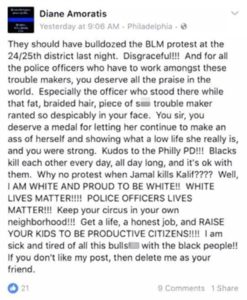In the past months, there have been a massive amount of protests across the Country. These protests often involve some combination of the Black Lives Matter movement, officer-involved shootings, Donald Trump, and Hillary Clinton. Obviously these are all hot-button topics that draw an immense amount of passion and enthusiasm from everyone involved.
So what happens when an employee says something while not at work about the protests that might be considered discriminatory or racist? For example, in Richmond County, South Carolina, seven first responders have lost their jobs over social media comments about a Black Lives Matter protest which occurred on July 10, 2016. One senior paramedic who worked for the company, Tommy Boland, commented on facebook that he will “donate to whoever runs over protesters in the roaddway (sic).” He was terminated a few days later.
In Philadelphia just last week, an employee was fired after posting a rant about a Black Lives Matter protest on her facebook page. Instead of following this opera signer’s more subtle approach to support his “All Lives Matter” cause, Diana posted the following on her facebook page:

She was soon fired as well. But doesn’t the first amendment guarantee us the freedom of speech?! This is America after all.
Wrongful Termination
Well… kind of. The general rule in Illinois and most other states is that employers can terminate employees for any reason or no reason at all. This is called at-will employment – the employee is working at the will of the employer. If your boss does not like you playing Pokemon Go in your free time, he or she is likely free to legally terminate you for that reason.
However, like any other legal rule, there are exceptions that may prevent the employer from terminating an employee for comments made while not at work. Here are some of the most common exceptions:
- Freedom of Speech
The First Amendment to the Constitution protects our freedom of speech. However, the Amendment only prohibits the government from abridging freedom of speech, not private entities. In essence, while the government cannot arrest you or otherwise punish you for making those unfortunate racist comments on facebook, your employer is usually free to terminate you based upon the comments made at home.
Public employers, on the other hand, do not have as much freedom as their private counterparts. The Supreme Court has found that government officials are prohibited from retaliating against an employee because of the employee’s engagement in constitutionally protected political activity. See Elrod v. Burns, 427 U.S. 347 (1976). In these cases, the employee must establish that he or she speaking as a citizen, rather than speaking on matters pursuant to employment duties. See Spiegla v. Hull, 481 F.3d 961, 965 (7th Cir. 2007).
- Employment Contract
One way to avoid the often unfair at-will employment doctrine is for the employer and employee to enter into an employment agreement. In the contract, the parties can agree that the employee can only be terminated for-cause, which can only be based on the employee’s misconduct while at work. Government employees, union employees, and executives are generally more likely to be subject to an employment contract. However, most individuals are not subject to such agreements, and are subject to the employment at-will doctrine.
- Concerted Activity under the National Labor Relations Act
Another potential reason an employer cannot legally fire an employee for comments made while off-duty is the worker’s comments are protected under the National Labor Relations Act (NLRA). The NLRA prohibits most employers from retaliating against employees (whether in a union or not) when the employee engages in “concerted activity.” This is defined as two or more employees taking action for their aid or protection regarding the terms of their employment. Thus, an employee covered by the NLRA is generally free to complain about working conditions on facebook if he is doing so to potentially discuss the conditions with other employees.
Conclusion
Thus, even though this is the land of the free, employers are generally free to terminate employees for off-duty comments on facebook and elsewhere. I have provided some exceptions to the general rule that are likely to apply to off-duty comments. Obviously there are other exceptions to the general at-will employment doctrine (such as the prohibition to discriminate on the basis of race), but I only the listed those most likely to apply in the situation.
